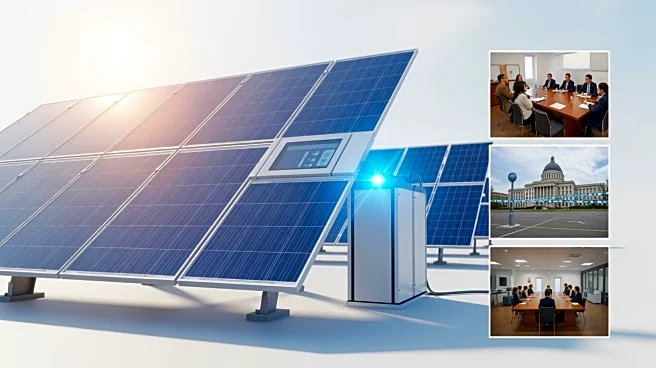What's Happening?
Masdar, a renewable energy company based in Abu Dhabi, UAE, has initiated a pioneering project that integrates a 5.2 gigawatt solar power plant with a 19 gigawatt-hour battery energy storage system. This
innovative system is designed to provide a continuous power supply, mimicking traditional baseload generation plants. The project aims to deliver 1 gigawatt of power to the grid around the clock, effectively flattening the production profile and easing grid management. The system's design allows for direct current (DC) electricity produced by solar panels to be stored without conversion, enhancing efficiency and reducing costs. The project is expected to power 500,000 homes and avoid 5.7 million metric tons of emissions annually.
Why It's Important?
This development marks a significant advancement in renewable energy technology, demonstrating the potential for solar and battery systems to replace traditional fossil fuel-based power plants. By providing a stable and continuous power supply, the project addresses one of the main challenges of renewable energy—intermittency. The success of this system could set a new standard for clean energy projects worldwide, potentially reducing reliance on fossil fuels and contributing to global efforts to combat climate change. The economic implications are also notable, as the project represents a fixed cost investment with minimal ongoing maintenance compared to traditional power generation, offering a sustainable and cost-effective energy solution.
What's Next?
As construction begins, the performance of this system will be closely monitored. If successful, it could lead to wider adoption of similar systems globally, influencing energy policies and investment strategies. The project may also prompt further innovations in renewable energy technology and storage solutions. Stakeholders, including governments and energy companies, will likely evaluate the project's outcomes to assess its viability as a model for future energy infrastructure.
Beyond the Headlines
The project highlights the potential for large-scale renewable energy systems to transform unproductive landscapes, such as deserts, into valuable energy assets. It also underscores the importance of integrating energy storage with renewable generation to achieve a reliable and sustainable energy supply. The initiative may inspire further research and development in energy storage technologies, which are crucial for the transition to a low-carbon economy.










